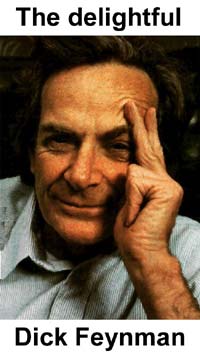
Table of Contents:
 Adolfo Peña, MD, and Ofelia Paco, MD, of San Marcos National University, Lima, Peru, recently did an interesting study to examine the opinions, attitudes, and interest of medical students in regard to science and pseudoscience. A questionnaire was administered to 124 medical students of the University in Lima, Peru.
Adolfo Peña, MD, and Ofelia Paco, MD, of San Marcos National University, Lima, Peru, recently did an interesting study to examine the opinions, attitudes, and interest of medical students in regard to science and pseudoscience. A questionnaire was administered to 124 medical students of the University in Lima, Peru.
67% said they were interested in science and technology news.
But 76% said they had not read any science magazine or book — other than medical texts and journals — in the last five years.83% of the respondents said that science is the best source of knowledge.
What really startled these researchers were the students' answers to inquiries re the ancient flummery known as astrology:
50% had the opinion that some people possess psychic powers.
Conclusion: Medical students' attitudes toward genuine science are generally not favorable. 13% said that astrology is "very scientific" and 40% stated that it is "sort of scientific."
Said the researchers:
. . . it is desirable that physicians know and understand the theoretical foundations of science, so they may develop a critical and skeptical mentality. . . . a scientifically literate person should distinguish and recognize expertise, dogma, pseudoscience, epistemic limitations, the temporal nature of knowledge, effective argumentation and relationships among claims, evidence and warrants.
. . . Pseudosciences are defined as "claims presented so that they appear to be scientific even though they lack supporting evidence and plausibility." In contrast, science is "a set of methods designed to describe and interpret observed and inferred phenomena, past or present, and aimed at building a testable body of knowledge open to rejection or confirmation. Pseudoscience topics include yogic flying, therapeutic touch, astrology, fire walking, voodoo magical thinking, Uri Geller, placebo, alternative medicine, channeling, the Carlos hoax, psychic hotlines and detectives, near death experiences, UFOs, the Bermuda Triangle, homeopathy, faith healing, and reincarnation.
Pseudosciences receive favorable ratings by university students. . . . a survey of 1,500 first-year college students found that 48.5 percent of arts and 33.4 percent of science students considered both astronomy and astrology as sciences. In one poll of students in Columbia's graduate school of journalism, 57 percent of the student journalists believed in extrasensory perception, 57 percent believed in dowsing and 47 percent in aura reading.
Beliefs in the paranormal and pseudoscience may indicate a decline in scientific literacy and critical thinking. Their prevalence among university students has motivated some to affirm that education in industrialized countries is not fulfilling its mission appropriately.Science has enabled successive generations to achieve an increasingly comprehensive and reliable understanding of the human species and its environment. In line with this assertion, medicine soon has had to be guided by science. . . a key objective of medical education has been making medicine a scientific profession.
Concerning those Columbia School of Journalism figures, remember that such students are largely educated in the humanities, not science. That does not, however, excuse the fact that they should have a better understanding and basic knowledge of what science is, and is not.
Reader Dave Roscoe of North Bay, Ontario, Canada, gives us this item:
I'm sure there is a word for that feeling that you get when you hear or read something that just "gels" with you but I don't know what it is. You know that "I wish I'd said that" kind of feeling? I often get that feeling when I read your commentaries but I'm not just writing this to you to butter you up. I came across an address that really moved me in that way and I just wanted to share it. It's a commencement speech that Alan Alda gave to the Caltech class of 2002. See: http://pr.caltech.edu/commencement/02/alda.html. Here's a snippet from that speech:
Interestingly, they expect the plant to have active properties to cure them, but they're certain it has no active properties that can harm them. How do they know that?
I mention this, not to denigrate anyone's beliefs — I feel strongly that we're all entitled to our beliefs, just as we're entitled to our feelings — but I bring it up to point out that we're in a culture that increasingly holds that science is just another belief. And I guess it's easier to believe something — anything — than not to know. We don't like uncertainty, so we gravitate back to the last comfortable solution we had, no matter how cockeyed it is.
But Feynman was comfortable with not knowing. He enjoyed it. He would proceed for a while with an idea as if he believed it was the answer. But that was only a temporary belief in order to allow himself to follow it wherever it led. Then, a little while later, he would vigorously attack the idea to see if it could stand up to every test he could think of. If it couldn't stand up, then he simply decided he just didn't know. "Not knowing," he said, "is much more interesting than believing an answer which might be wrong." But right now, instead of reason, a lot of people are making use of wishes, dreams, mantras, and incantations. They're trying to heal themselves using crystals, magnets, and herbs with unknown properties. People will offer you a pill made from the leaf of an obscure plant and say, "Take it, it can't hurt you, it's natural." But so is deadly nightshade.
He's managed to express something that I guess I sort of knew but could never put into words. My particular love is astronomy and I am a member of an astronomy club where I am quite active in our public outreach program. I've realized that I probably wouldn't be as keen as I am if a particular friend hadn't loaned me a certain book years ago. It was one of Isaac Asimov's collections of short articles on astronomy. Asimov was not only an entertaining writer but he also had the habit of re-issuing his articles with footnotes to indicate where hypotheses had been disproved or new data was available. Without realizing it I was learning that there was more fun in finding out than in just "knowing" or accepting a bunch of "facts". It was an article of Asimov's that led me to Carl Sagan, an item by Sagan that led me to Stephen Jay Gould...
I think the passion for seeking answers is contagious if you're just exposed to it the right way.Alda ends his speech by urging the graduates to follow in Feynman's footsteps by sharing not just their discoveries but also the journey that led to their discoveries. He suggests they each pick one aspect of their work that gives them particular joy and find a way to make it understood by a million people.
I couldn't agree more, Dave. And I'm sure that many writings by those such as Asimov, Gould, Sagan, Dawkins, and Feynman have initiated interest in various sciences and technologies, in persons who might otherwise have passed them right by. There are the people who, simply by saying and writing what they think, start intellectual landslides that produce new and exciting experiences for the curious and perceptive. We need more folks like this.
 Dick Feynman was more remarkable than you can imagine. He was interested in, and curious about, just about everything. One time, I was with him in a retail shop and I found him going about lifting framed pictures away from the wall and peeking behind them. "What are you doing?" I asked. "I think that if they used two nails, spaced about two inches horizontally, it would get around the problem of frames becoming askew," he replied, "and the increase in cost would be negligible!" This was typical Feynman, illustrating how the mind of a Nobel laureate could be concerned with such a mundane situation, as well as the higher aspects of quantum physics. I saw him examining fallen leaves, a freshly-painted door, and the way in which an elastic fabric deformed when stretched. Anything and everything fascinated him, and he could get highly excited over a kitten or a sunset — equally.
Dick Feynman was more remarkable than you can imagine. He was interested in, and curious about, just about everything. One time, I was with him in a retail shop and I found him going about lifting framed pictures away from the wall and peeking behind them. "What are you doing?" I asked. "I think that if they used two nails, spaced about two inches horizontally, it would get around the problem of frames becoming askew," he replied, "and the increase in cost would be negligible!" This was typical Feynman, illustrating how the mind of a Nobel laureate could be concerned with such a mundane situation, as well as the higher aspects of quantum physics. I saw him examining fallen leaves, a freshly-painted door, and the way in which an elastic fabric deformed when stretched. Anything and everything fascinated him, and he could get highly excited over a kitten or a sunset — equally.
He's missed...
THE JREF MILLION IS SURELY WON
Reader Phil Ray, a medical research analyst in Lexington, Kentucky, tells us about some more "high-end" audio flummery he's discovered:
Apparently, according to this site, you can improve all kinds of audio devices or recording media performance just by writing "O.K." on them — or a piece of tape stuck on them — with a "specially treated" marker pen. Writing "NO" makes things sound much worse. There is much more available from "P.W.B. Electronics" as well, that could be eligible for the JREF Prize.Your mention of the "Tice clock" and other audiophile snake-oil devices got me digging around on the internet for more. I ran across a couple of good sites, but the one that takes the cake is www.belt.demon.co.uk/index.html.
This is the fabulous "Red 'x' Pen" that you can have for a mere US$87! And yes, there sure was more eligible material. For example, I found a glowing review of some mystical P.W.B. sticky foil on that site. It claimed that tiny little scraps of it could improve a wide spectrum of our daily lives:
These shiny little devil-strips are supposed to work their effects just by placing them on pretty much anything in the system — or the house, for that matter. Suggested application included batteries in remote controls, clocks, and calculators, mains plugs on amplifiers, CD players, tuners, televisions, computers, even fax machines, light switches, transformers, auxiliary power sources, central-heating radiators or air-conditioning units, even equipment casings, lids, and LED displays.
Here's an example of how versatile the wondrous P.W.B. Electronics Electret Foil is, as explained by Mrs. May Belt, one of the promoters, retailers, and producers of P.W.B. products. They had been experimenting with improving the sound of their system by applying a scrap of this foil to a CD:
After the short coffee break we returned to the listening tests. The sound was dreadful, it was absolutely appalling! Peter tried everything he knew but could not get the previous "good" sound back. He knew that the only thing he had done in the past half-hour was to apply a chemical to the stain on the small table. He took the table out of the room and listened again. The "good" sound was back! With the table returned to the room, the sound was dreadful again. Peter remarked, "There is no way we can carry on with our listening tests with that table in the room," so the table was banished to the garage.
We had no explanation for what had happened but we remembered this incident because it was so surprising and startling. It was a few months later that I happened to be reading an article — an article on plants! In the middle of this article it stated "and when the (???) plant is under stress, it produces the chemical ????" — this was the chemical we had applied to the small table!!! I read this article out to Peter and we looked at each other. Here was the chemical we had used being described as a "stress chemical." Peter then began to reason out, "I wonder if it was us (human beings) who were sensing this "stress" chemical and going under tension — and this was the reason why the "sound" was perceived as "dreadful."During one set of listening experiments, we had a short coffee break. In the listening room was a small wooden table which had had something spilt on it, causing a nasty stain. Peter decided to treat this stain and applied a chemical to it. No success — the stain was just as bad. Peter shrugged his shoulders and said, "Oh well, we will just have to live with the stain, at least I have tried to remove it."
I'd find it difficult to comment here, especially since my eyes are full of tears from laughing. Are these simply raving loonies, or is it a very unfunny joke? I wish it were a joke.
I found a glowing review of this magic foil at Greg Weaver's April 1999 Rainbow Foil review and immediately wrote him at gregw@soundstage.com:
Are you interested?Mr. Weaver: I've been forwarded some comments you made on the "P.W.B. Electronics Electret Foil" and wished to inform you that if you are able to repeat your experiments — double-blind — you would certainly win the JREF million-dollar prize as described at www.randi.org/research/index.html and www.randi.org/research/challenge.html.
I'm not going to expect a response, of course, but I'll inform you if I get one. Phil has more:
I'm so glad to live in the 21st Century — an era when wonders never cease!I looked up "Shakti Stones," too, at http://www.shakti-innovations.com/index.html. They have the added benefit of having an "East Indian" name. They not only make your stereo sound better, but another version improves engine performance and increases horsepower in your car!
 The Shakti Stones, fortunately, don't even have to be connected to your sound system, but can be simply placed nearby, to produce wonderful improvements! The instructions simply say:
The Shakti Stones, fortunately, don't even have to be connected to your sound system, but can be simply placed nearby, to produce wonderful improvements! The instructions simply say:
Use of the Stones could not be simpler, simply place them near power supplies, components or CD/DVD/SACD players, the nearer the transformer the better.
Incredible! One reviewer, "expert" Dick Clark of Audio Journal, ended up with eleven of these stones ($2,530 worth!) placed all over his system, and he raves about the improvements! Phil, I'm an equal-opportunity kind of guy, so I sent this inquiry — via both e-mail and postal mail — to a Mr. Mintz, who had also very enthusiastically endorsed his Shakti stones:
I await your response with great interest.I understand that you have found wonderful results from the use of "Shakti Stones" in conjunction with your sound system! To amplify your delight, I inform you that if you can successfully perform a double-blind test of these stones, as you have described, you can win the million-dollar prize offered by this Foundation. See details at www.randi.org/research/index.html and www.randi.org/research/challenge.html.
Now, Weaver and Mintz may or may not respond. I'll keep you updated on the matter. Consider: if they do not respond, why did they choose that option? Several possibilities present themselves:
Perhaps they are afraid to test their firmly-stated convictions on the matter.
They might be independently wealthy and thus disinterested in the million-dollar prize.
It's even possible that these people are fictional inventions of the vendors of these hi-tech advances in science.Maybe they now find that they were self-deceived.
There must be some reason. I am sending out 11 letters to audio reviewers who endorsed this thing, making the same offer.
Reader Chris Sylvain advises me, concerning the Penta Water farce. (See previous references on our page.)
I've also written to Stephen Lower, a retired chemistry professor from Simon Fraiser University, at steve@chem1.com on this topic. He's written about Penta water as well.
I am troubling you with this message today because the Penta water claims were propounded yesterday on Anderson Cooper's CNN show segment on "Sport Water" with his expert guest, an editor for Health Magazine. I credit Cooper for asking "restructures the molecular clusters, if that is at all possible?" but fault him for not following up on his guest's response "Yes."
I believe leaving these claims unchallenged in the view of the Patent Office and the Federal Trade Commission is to permit the slow reestablishment of Patent Medicines!Never mind getting the Holloways to agree to the JREF Challenge, you have this wonderful document full of scientific claims and fully documented test conditions to work with: U.S. Patent 6521248. Read the wonder that is the patent claim by clicking here.
Slow? Chris, it's all coming back into circulation again, and we're helpless to do anything about it. No politician dares to question such beliefs, and our collective health is put in danger by such irresponsibility. Bear in mind that Holloway of Penta Water agreed to do tests for the JREF million-dollar prize, and then suddenly withdrew when it became evident that we were really serious about following through. That's what they all do. Can you say, "Sylvia Browne"?
There is an amusing site at www.psimuseum.com which advertises Uri Geller's "Psychic Museum" and his awesome powers, stating that:
Uri is the motivational mindpower coach to premier league footballers, industrialists, Formula One drivers and Olympic athletes.
Yes, that's true, but all of them go into losing streaks immediately....! Reader Helen Cadman noticed this blurb, and asks:

I'd love to know how he proposes to show me my "auric field" and "acupuncture meridians" — my mother warned me about men who make that kind of offer..... £22? For a "museum" visit which has no educational value whatsoever and merely perpetuates the peddling of complete dribble and nonsense? I'm practically speechless. If it didn't cost so much I might be tempted to pop along for a look in order to report back, but I don't want to encourage this tomfoolery by throwing money at it.
The site's amateur status is pretty well revealed by this illustration, in which not only repeats that old canard, but gets the figure wrong. Sort of an incorrect error.... The original statement — using a figure of 10 percent — referred to the fact that we only knew for sure the specific functions of about that fraction of the human brain, though the figure has risen dramatically since it was first expressed and misquoted. But, in pseudoscience, I suppose it's just as well to be totally wrong rather that doing just half the job....
Back on June 30th, 1908, it appears that a huge meteorite fell down in an evergreen forest near Tunguska, in central Russia. The site (see map) has been an area of active interest for scientists, ever since; they go there trying to decide the nature of the object, and to locate what's left of it — if anything. If it was a chunk of ice — probably a comet — there wouldn't be much to find.
 Well, now a new expedition has headed out from Krasnoyarsk to Evenkia, not to see if and what, but with an already-declared conclusion — hardly a scientific approach. Says a news release on the project:
Well, now a new expedition has headed out from Krasnoyarsk to Evenkia, not to see if and what, but with an already-declared conclusion — hardly a scientific approach. Says a news release on the project:
Using metal detectors, 14 members of the expeditions want to examine the taiga near Poligus township and the Stony Tunguska River. The search area is located 500 km to the west of the site where previous expeditions were looking for the meteorite's remains. According to Mr. Labvin, space photographs of this region show the presence of metallic debris, which can be related to a technogenic [???] catastrophe, which occurred here 100 years ago.Researchers will seek material evidence denying the main version of the century-old events. . . . "We intend to find proofs that not a meteorite but an extraterrestrial spaceship clashed with the Earth," expedition chief Yuri Labvin, heading the Tunguska Space Phenomenon public foundation, told journalists.
Mr. Labvin, scientists don't state their conclusions in advance. I'm confident that your report will find that this was an extraterrestrial space ship, because that's what you're looking for, and if a camper left a can-opener behind, it will surely be on sale via E-bay in the near future, offered as an example of advanced and exotic technology from beyond the stars.
And, I cannot imagine how you were able to conclude from "space photographs" that there is "metallic debris" to be found there. If you find a chunk of iron-nickel on the site, be advised that it might be a part of the object that fell there, rather than a scout ship from Betelgeuse. Or do I stretch your imagination too much?
This expedition will conclude that a spacecraft fell in Tunguska. Count on it.
Reader E. Bert Wallace is an Assistant Professor at the College of Arts and Sciences of Campbell University, and he keeps us informed of the latest in hi-tech quackery:

Yesterday (23 July 2004) I heard a story on NPR about the support staff for the US Postal Service Tour de France team. In addition to mechanics and MDs, a chiropractor is on staff. In his interview, he repeated much of what I've heard before about chiropractic. But he also talked about "earthing," a procedure (not completely described) in which the patient is "plugged into the ground," which apparently taps into "natural earth frequencies" that, among other things, "reduce inflammation." "It's pure magic," said the Doc.
I agree with this genius, Bert, it sounds just like "pure magic." And if it works, of course, this chiropractor is in line for the JREF million-dollar prize.... I'm sure he's busting his fingers knocking out an application, right now. Or maybe not....
James C. Smith is an aerospace engineer in Fairfax, Virginia. He has published an excellent article on the Mexican Air Force UFO flap that so entranced us all recently. It can be found at e-skeptic #28.... What? You're not subscribed? Just send an empty message to join-skeptics@lyris.net and get on Michael Shermer's Skeptic Magazine list! Hey, free is a very good price! Then look for #28 and read what that flap was all about....
Have you ever suspected that — just maybe — the media could be unbiased? Reader Reilly Ridgell has noticed that while there was a great fuss made over the recent Columbia University study that seemed to prove the efficacy of prayer in cases of serious illness, the media lost interest in this when it turned out to be a fabrication. But, even more importantly, when a very definitive and quite similar test was done at Duke University with a much bigger database, it received scant attention in the press because the results were not unexpected, and certainly not sensational — and therefore of very little interest. Observes Reilly:
Re the issue of prayer helping people recover from illness, you should take a look at the Duke study. Results were published I believe earlier this year. Anyway, it was a three-year study of more than 700 cardiac patients, half prayed for and half not. Prayers came from cloistered nuns, Jewish prayers stuck on the Wailing Wall, Buddhist monks, and of course many evangelical Protestant groups. Neither group, nor their doctors, knew who was being prayed for, and who not. The results: nothing. There was no difference in the recovery rates of members in either group. This is a far more exhaustive study than the much criticized Columbia one.
 Reilly also comments on something said by Bill Maher the other day:
Reilly also comments on something said by Bill Maher the other day:
Maher made an interesting comment. When [Larry] King asked him why he didn't like the Bush administration, Maher answered something to the effect that Bush was a "born again" Christian expecting the "rapture" and making decisions under the color of that belief. He then mentioned Jefferson's quote about the Book of Revelations (the ravings of a lunatic), and said that if he's on a ship, like the US ship of state, he wants a captain who uses a compass and navigates scientifically, not a captain who kills a chicken and then tries to read the entrails.
An excellent comment by Maher, but it leaves me wondering why, several years ago when I appeared on "Politically Incorrect," Bill gave me a very hard time when I express my disbelief in supernatural powers. Perhaps augury is supernatural, and 144,000 people floating up to heaven, isn't?
Reader Kelly Gaul of Pennsylvania is trying to be very understanding of a local merchant:
I have also noticed the dreadful decline of the science section over the years. As the occult section (like the spread of a mold) spread out, the science section of the bookstore dwindled. The books of science now occupy an area about the size of what the occult started out as years ago. Sigh.
The bookstore needs to make a profit, and what is popular right now and selling well? The occult. If only we could get people to realize that their money could be better spent on something constructive instead of something destructive. Ah well, the store still sells plenty of great books and I'm not going to give up going there. I just wish that people would realize how ridiculous all that occult mumbo jumbo is and bring themselves into the real world.I have something very disturbing to tell you about my local bookstore. I've been going to this rather large and wonderful bookstore for over ten years. I have watched it grow and I have watched the available literature change. Over the years, I've seen a rather painful change, which is the enormous growth of the occult book section. Years ago, I remember the occult section started small and occupied a few shelves which were discreetly tucked into a corner of the bookstore. Now, the occult book section is several bookcases long and practically eats up a corner of the store.
Kelly, have you discussed this with the owner or manager? Sometimes just a few words in the right direction can accomplish wonders. Even a slight change in emphasis of the merchandising, could be an improvement, but management needs to be informed....!
Winston Churchill said it: "Men occasionally stumble on the truth, but most of them pick themselves up and hurry off as if nothing had happened."
Dear reader, have you been hurrying off....?
Next week, Baloney in the Toaster, among other hot items....
